Last Updated on October 6, 2025 by Ewen Finser
During my time as a tech consultant, I’ve spoken with numerous clients who jumped on the Smartproxy (now known as ‘Decodo’) bandwagon based on its reputation and fairly competitive pricing.
While it’s a reliable mid-tier proxy provider, Decodo has limitations, which means your business should sometimes consider alternative solutions.
This is particularly true if you plan to scale your project’s scope or have very specific technical requirements, as if you’re using Decodo, you’ll almost certainly have to consider more robust alternatives.
Why would you want an alternative to Decodo?
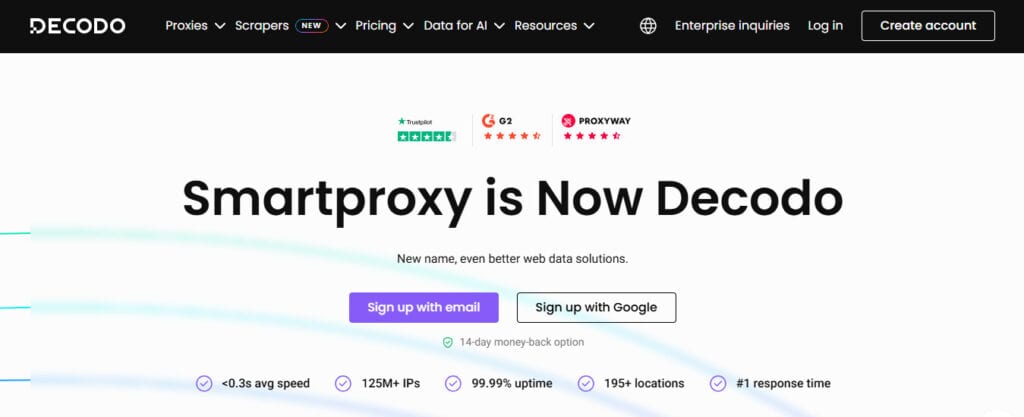
Burdensome KYC process
Admittedly, most proxy providers try to verify their customers’ identities, but this turned into an ordeal for one of my clients, who had to wait days after submitting the required documents.
They also said they were asked for additional information multiple times, and when they followed my advice to try an alternative provider were not credited a full refund.
From checking TrustPilot, it’s clear that my client wasn’t alone in this, as other Decodo customers have paid for a subscription, only to run up against KYC blocks.
Limited Free Trial
While Decodo does offer a free trial, it’s very limited: only three days and 100 MB of traffic. This likely isn’t enough to do any in-depth testing. You also have to enter your payment information. If you forget to cancel the trial (by sending an email) then your payment card will be charged.
Complex Pricing
Most proxy providers offer a subscription model, e.g., up to 50 GB of traffic per month for $5/GB. Decodo follows a much more complex pricing structure based on the number of IPs you need, as well as the amount of traffic and the type of proxy. For instance, you can pay as little as $3/GB for traffic – provided you pay $3,000 a month for 1,000 GB of traffic. There’s a 14-day money-back guarantee provided you pay by a refundable method like credit card, i.e., no cryptocurrencies.
Bottom Line Up Front
After helping many clients evaluate proxy providers (and assisting more than one migrate from Decodo), I’ve found that Bright Data is the best alternative.
While Bright Data does verify the identity of customers, its process is transparent and quick. There’s also a special fast-track process for residential proxy access to over 250 popular domains that doesn’t require you to go through KYC onboarding.
There’s a more generous 7-day free trial with no payment information required. You can even sign up for a freemium subscription of up to 15 data center IPs with 2 GB of traffic per month, so you can test Bright Data’s infrastructure for longer.
Most importantly, Bright Data delivers consistent and reliable residential IPs. I’ve tested many providers and have found this one’s network delivers much better success rates and lower detection rates than any other.
All of this said, even if you’re seriously considering an alternative to Decodo, the right proxy provider is always going to be the one that matches your specific operational requirements and budget.
Read on to find more about why I think Bright Data is the best alternative, as well as to learn more about other reliable providers.
Whenever I need to grab structured web data, real-time or historical, I use Bright Data. It makes it easy to pull info from public websites at scale, and it fits right into whatever AI model or workflow I’m working on. Fast, flexible, and super reliable.
The Best Decodo (Smartproxy) Alternatives
1. Bright Data
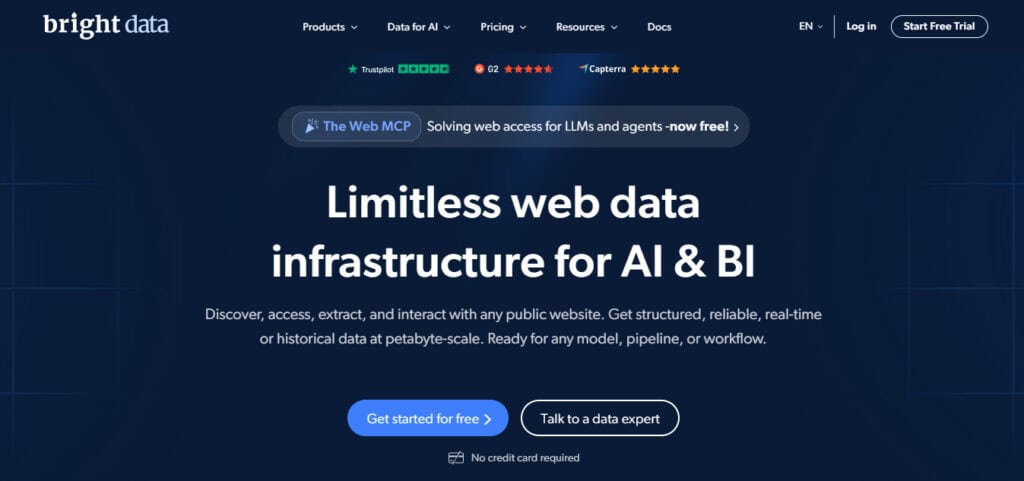
Pros
- 150 million IPs in 195 countries
- Transparent and efficient KYC process
- 99.95% success rate
- Advanced targeting down to ZIP code
- Generous free trial and ‘freemium tier’
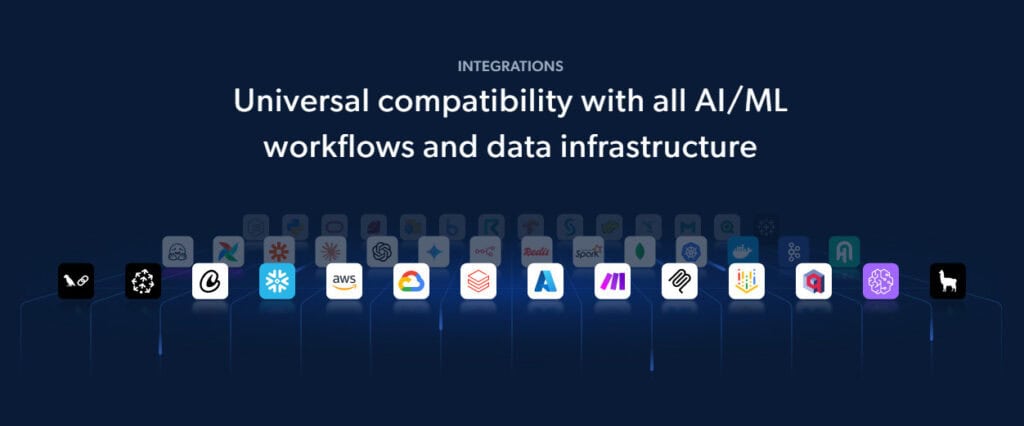
Cons
- Company email registration may be required
- Premium pricing structure
As I outlined in the above section, these days Bright Data is my go-to recommendation for clients who need a reliable, premium proxy provider.
During my tests, I found that Bright Data’s residential proxies outperformed Decodo’s – even for sites with sophisticated anti-bot measures. There’s an extensive page on the main site on how the IPs are ethically and properly sourced, too.
When I signed up, I was asked to provide a company email address, though I saw that these days you can register using a Google or GitHub account too.
The 7-day free trial is generous, but I was also very impressed with the ‘freemium’ tier that gives you up to 15 data center IPs and 2 GB of traffic – no credit card details are required. The ‘Proxy Manager’ dashboard lets you manage all proxy types from a unified interface.
Admittedly, Bright Data isn’t a budget option. Standard prices for residential proxies is $8.20/GB on a PAYG basis. However, there’s currently a 50% discount code you can apply at checkout, i.e $4.20/GB.
Why it’s better than Decodo: As I outlined earlier, Bright Data has a much clearer and quicker KYC process. You can get started right away with residential proxies for 200+ popular domains that don’t require KYC checks. It isn’t the cheapest option, but its pricing model is very clear. Unlike Decodo, you can also test out Bright Data’s features in-depth with its free trial or freemium tier.
Read our full Bright Data review here: Bright Data Review: Why I Think it’s Worth the Price Tag
2. Oxylabs
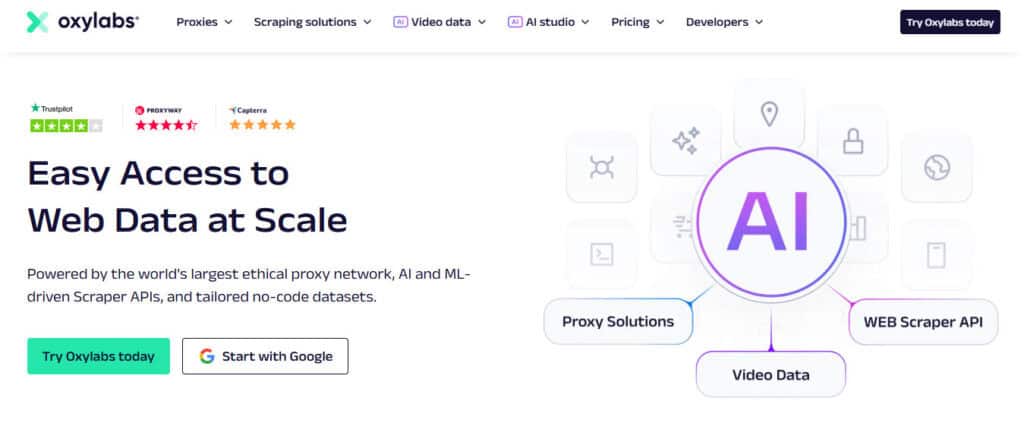
Pros
- Enterprise-grade infrastructure (+175 million IPs)
- Excellent compliance and legal framework
- 99.99% uptime guarantee
- Has Fortune 500 clients
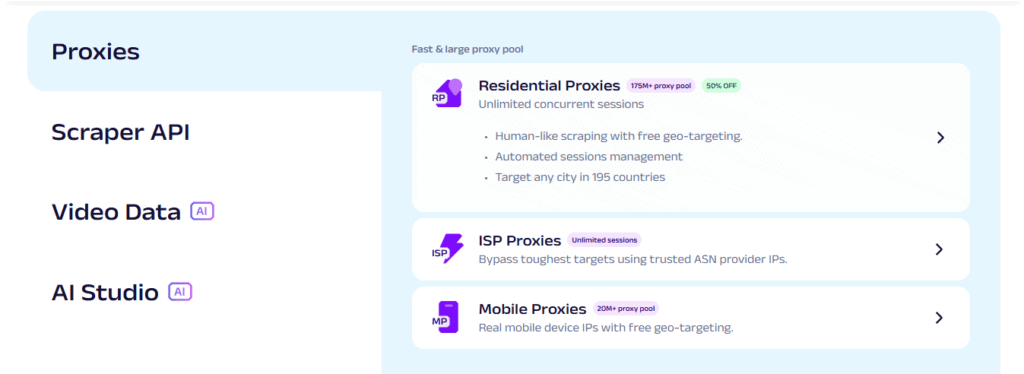
Cons
- Complex pricing structure
- Designed for enterprise-grade solutions
- No refunds for pay-as-you-go payments
If you’re engaging in a wide-scale project and your budget allows, Oxylabs can be an excellent option. It has an extremely large network across 195 countries. It offers the four main types of proxies, as well as dedicated data center proxies for superior performance. During testing, I found that response time was also close to that claimed (0.41s).
Oxylabs counts even Fortune 500 companies amongst its clients, but there also lies the rub: its premium pricing and features are unlikely to offer value if you’re engaged in smaller or mid-level sized projects.
For example, the ‘pay as you go’ pricing for residential proxies is $8/GB for up to 50 GB. Currently, there’s a 50% discount available, i.e. $4/G,B but this still may be beyond the budget of smaller companies. There are also no refunds for PAYG credit.
Why it’s better than Decodo: Unlike some users’ experiences with Decodo, I found the KYC process to be a breeze during setup. You’re simply asked some standard questions to provide information like your company name, address, and contact details, after which you can begin setting up proxies. You’ll also benefit from enterprise-level reliability and top-tier compliance.
3. SOAX
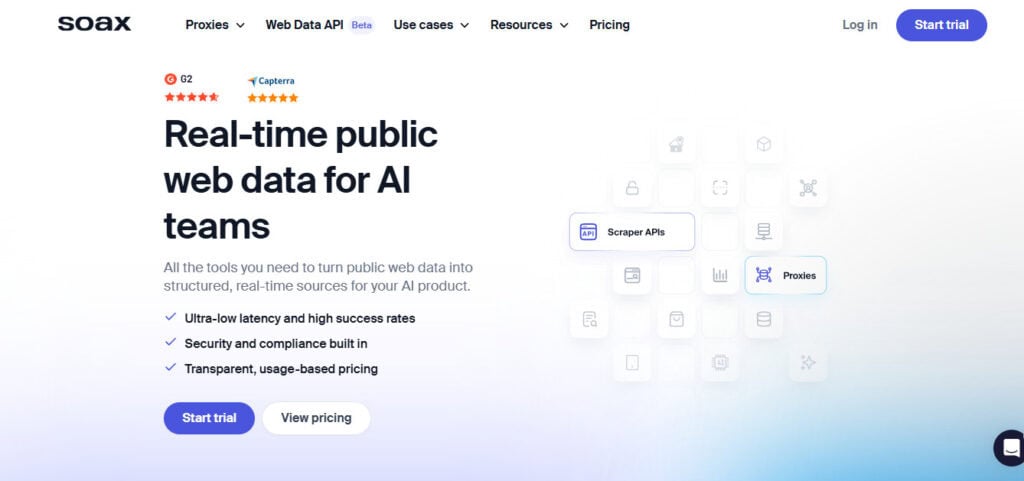
Pros
- Unified pricing across all proxy types
- 155+ million IPs in 195 locations
- Supports proxy type switching
- Multiple protocol support (HTTP/HTTPS, SOCKS5, UDP)
- Reasonable pricing for mid-level projects
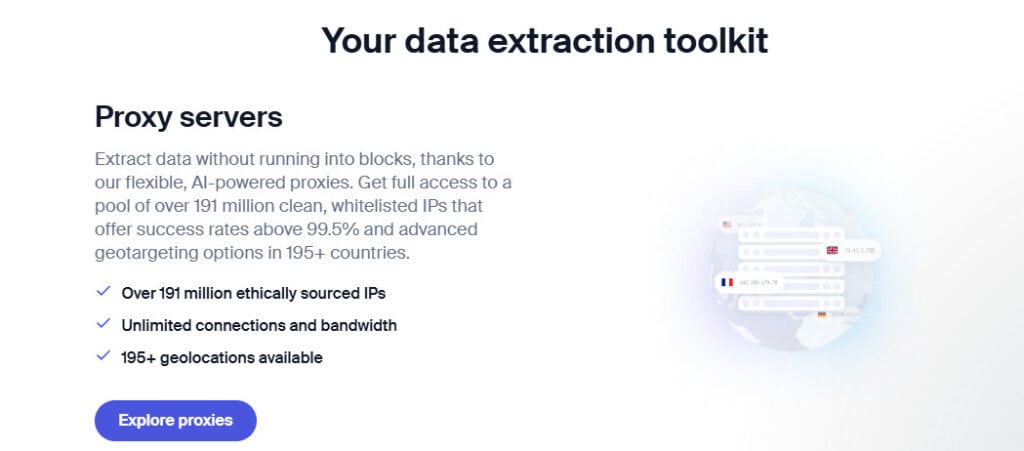
Cons
- Minimum subscription payments ($90 per month)
- Minimal trial (3 days/400 MB) costs $1.99
- Very limited API
While I stand by my recommendation that Bright Data represents the best proxy provider overall, I sometimes recommend SOAX to clients whose operations need to switch regularly between proxy types.
This is because the provider follows a fixed subscription model for all types of proxies. Individually, these are priced differently, but you pay the same monthly amount no matter which ones you use, e.g. $90.
This can be a two-edged sword if you don’t need the minimum amount of traffic available (in this case, 145 GB), which is why SOAX is better for mid-level projects. Setup is fairly transparent, and none of my clients have experienced KYC lockouts after making payments.
The dashboard is one of the most intuitive I’ve ever used, whereby you simply choose an authentication type, e.g., password, at which point you can choose your proxy type, protocol, IP rotation time, city, and so on.
Be warned, the API is very basic. It can display lists of locations and ISPs, but not much else.
Why it’s better than Decodo: SOAX’s unified pricing model is much simpler to follow than Decodo’s, plus it’s easy to switch between proxy types. The interface is simple, making it easy to hit the ground running and set up multiple proxies.
4. IPRoyal
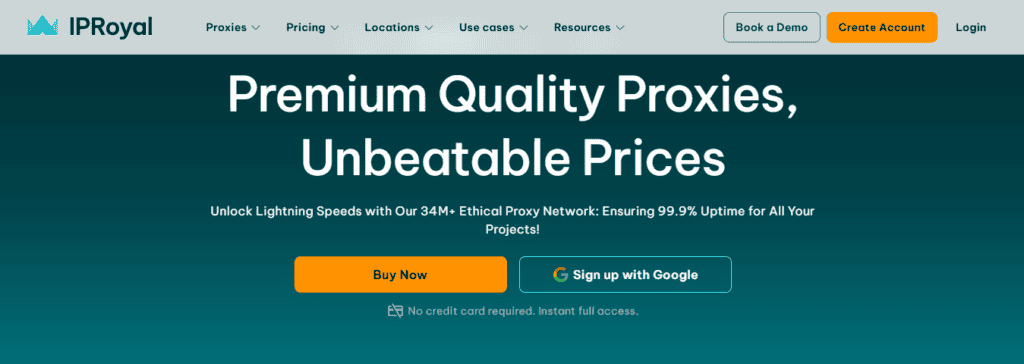
Pros
- Competitive pricing
- Reasonably sized IP pool (+32 million)
- Unlimited concurrent connections
- Simple interface
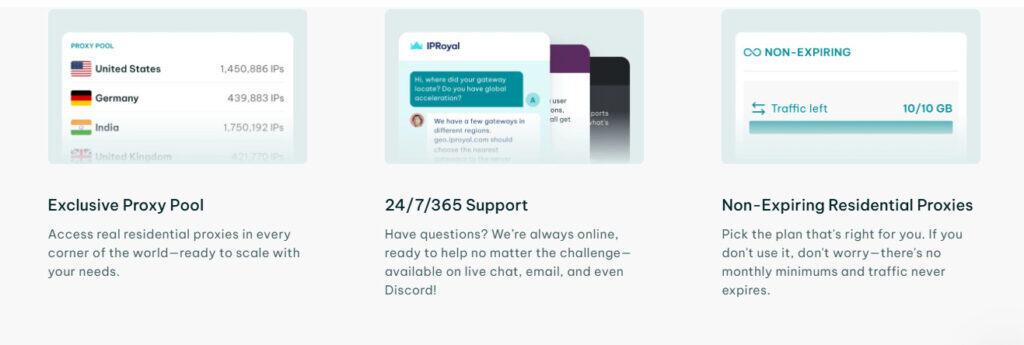
Cons
- No automatic free trial
- Basic features relative to enterprise providers
- Relatively low success rates on more complex sites
IPRoyal’s pricing is very reasonable, starting from $3.50/GB for residential proxies and $1.39 for data center proxies. There’s also a 5% discount if you choose to pay monthly rather than ‘pay as you go’.
Admittedly, IPRoyal has a much smaller IP pool than other providers, but during the tests I performed, I found the proxies were reliable for basic web scraping, and support concurrent connections. You also benefit from unlimited traffic for data center proxies.
The ‘non-expiring traffic’ is another major perk, as it means that any used GB can be rolled over from one month to the next, instead of being lost as with other major proxy providers.
Aside from a lack of advanced features, my only other major criticism of IPRoyal is that you have to contact the sales team to request a free trial. In other words, you can’t sign up for one automatically.
Why it’s better then Decodo: IPRoyal has transparent, low pricing, unlike Decodo’s more complex structure. While its features may be more basic, it offers reliable service quality.
5. Webshare
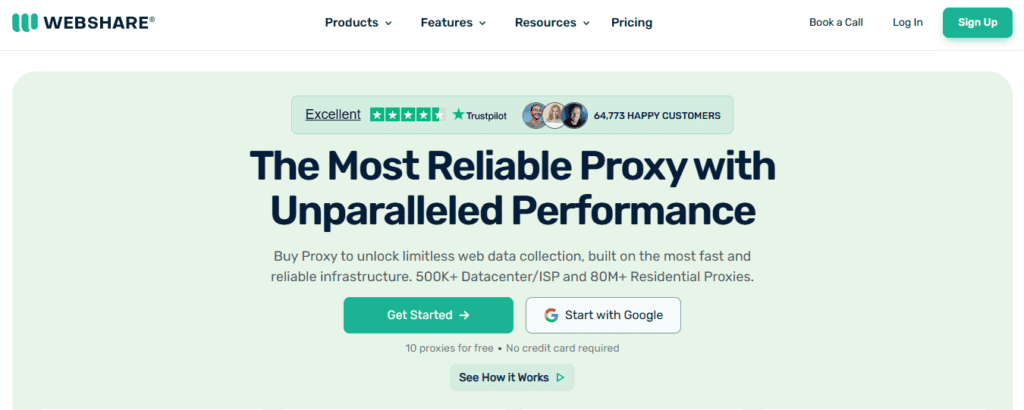
Pros
- Very competitive prices (From $1.99 for 100 IPs)
- Free plan (10 data center proxies)
- Fast data center and ISP performance
- Quick KYC procedure
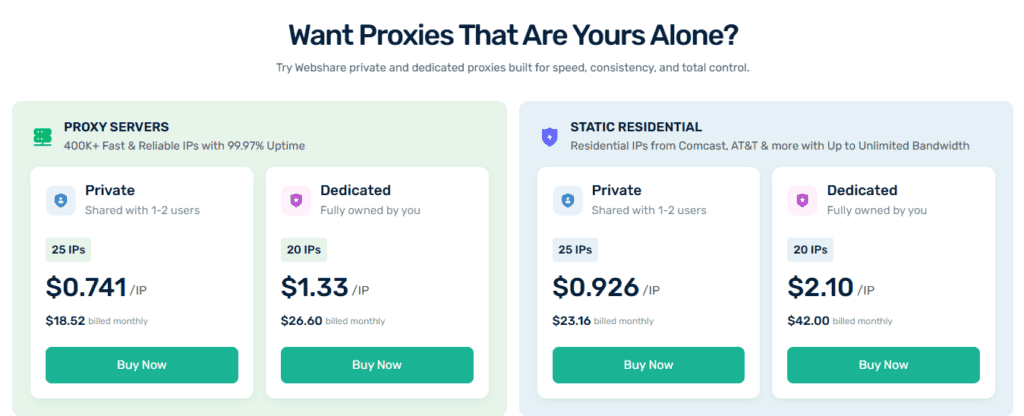
Cons
- No mobile proxies
- Relatively small IP pool (+30 million)
- No free trial for residential proxies
- Relatively basic features compared to premium proxy providers
This provider was acquired by Oxylabs in 2022, but is still run independently. This is reflected in Webshare’s prices, which are extremely reasonable, starting at $2.99 per month for 100 proxies. Further discounts (30%) are available for annual subscriptions. You can also sign up for a free tier to test up to 10 data center IPs.
Unfortunately, there’s no free trial for residential proxies, nor does Webshare support mobile proxies. However, if you don’t need diverse proxy types, then this provider is one of the fastest I’ve found to set up and use. Like Bright Data, you can get started using proxies right away, though certain websites like Netflix are restricted until you go through the brief KYC procedure (this took my client less than 5 minutes).
Why it’s better than Decodo: This provider eliminates virtually all of the pain points my clients encountered with Decodo. Webshare offers a free tier, straightforward pricing, and clearly delineated proxy types.
Common Mistakes Businesses Make When Choosing a Proxy Provider
Falling for misleading pricing
Decodo’s main page has $1.5/GB splashed all over it, which would be a very reasonable price for a residential proxy – but as I explored the pricing page, the best rate I could find was $3/GB. And that’s only if you’re willing to pay $3,000 per month for 1000 GB.
It’s only when I drilled further into Decodo’s pages that I found the $1.50/GB rate applies to a special ‘Enterprise’ tier, which requires paying $1500 per month plus VAT every month for 1000 GB of traffic. If you want something more modest, e.g., 250 GB, you’ll need to pay $2/GB ($500 per month plus VAT).
This kind of nebulous pricing by some proxy providers makes it hard for businesses to cost their project precisely. Instead, choose a proxy service with transparent pricing that includes all taxes and charges.
Ignoring KYC Implications
As most organizations know, all major proxy providers have KYC policies. However, these should be common-sense, clearly state what documentation is required, and then process it quickly so that your project can hit the ground running.
If you choose a provider with a reputation for applying KYC procedures inefficiently, as I felt happened with my client who chose Decodo, then this can cause major disruptions. This is particularly true if the suspension takes place after payment is made and the provider drags its heels about offering a refund.
Inadequate Testing
Trial periods, such as the minuscule three days and 100 MB of traffic offered by Decodo, are highly unlikely to be suitable for running thorough performance tests across multiple targets, assessing rotation patterns, and properly evaluating success rates. Instead, choose a provider that offers a free trial period of at least 7 days, or (better yet) a free tier so you can test for as long as necessary.
The Best Decodo (Smartproxy) Alternative
While Decodo might serve the needs of some mid-tier projects adequately, its mixed reputation surrounding a limited trial, KYC issues, and proxy quality means I find it hard to recommend to clients these days.
Instead, choose a top-tier provider like Bright Data that offers reliable, high-performance proxies without the operational headaches of lesser services.
Naturally, you should always consider your operational requirements first and foremost. Oxlyabs is an excellent choice for larger enterprise projects where scalability is key. SOAX is an ideal option if your operation requires switching easily between proxy types. IP Royal and Webshare may be best for businesses on a budget that don’t need a very large or diverse IP pool.
Above all, remember not to be swayed by marketing claims on a provider’s site. Instead, take the time to research and test its capabilities for yourself, so you can be sure that its capabilities truly do meet your operational requirements.
Whenever I need to grab structured web data, real-time or historical, I use Bright Data. It makes it easy to pull info from public websites at scale, and it fits right into whatever AI model or workflow I’m working on. Fast, flexible, and super reliable.


